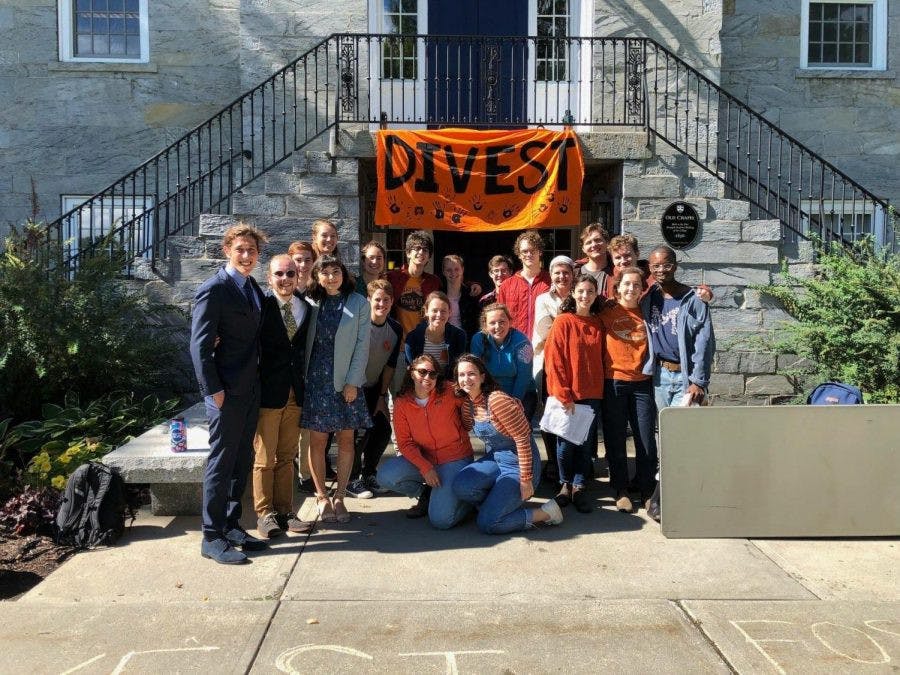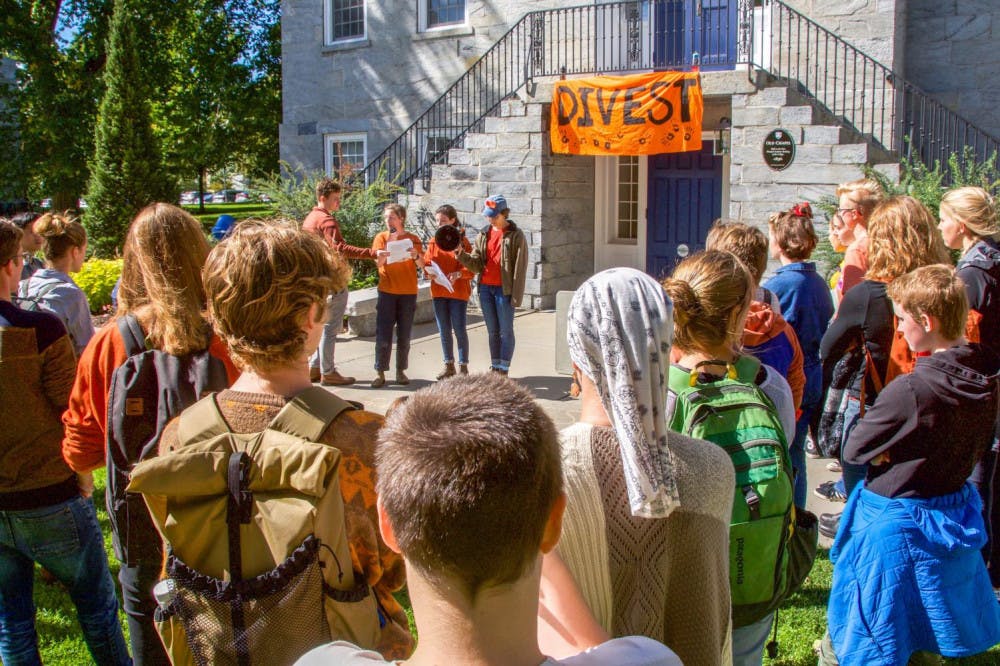This past Friday, Divest Middlebury took a major step towards our goal of finally aligning the college endowment with our mission statement. At 11:30 a.m., three students from Divest Middlebury arrived at Old Chapel to present the students’ position on fossil fuel divestment and the necessary steps the school must take going forward. Students gathered outside of the building to hear the presentation, intent on learning more about the movement that is currently gaining so much worldwide momentum. This day came as a result of years of effort by multiple generations of student and community activists; we are honored to build upon the work that initially created the Divest movement, and the influence of previous students’ activism has remained essential to guiding our cause forward.

Friday morning, three students met with the Board of Trustees to present the case for fossil fuel divestment on behalf of the student body. The presentation lasted 15 minutes and was met with applause and support from members of the Board. Trustees were engaged and curious; they inquired about paths forward and were supportive of the conversation. The sounds of chanting, singing and shouting from student activists surrounding the building added to the urgency emphasized in the presentation. Our movement is more than conversations behind closed doors, but a campus-wide issue; in fact, it was student power that made the presentation possible.
Last spring, the Middlebury student body demanded divestment through an SGA referendum in which 80 percent of students supported fossil fuel divestment with a 70 percent voter turnout, the largest in recent memory. Students pressed the Board to pledge divestment of all endowment assets that include any of the top 200 fossil fuel companies. This referendum brought the issue to the Board’s attention and showed them an irrefutable truth: divestment is a worldwide movement that addresses a crisis threatening members of our community at school, at home, and all over the globe. While divestment alone isn’t the solution to that crisis, it is a tactic that can fight it.
Middlebury students do not come from a single background unaffected by environmental struggles. We come from the coast of California, from mountains on fire, from decimated coal mining towns in Tennessee, from wetlands in Florida ravaged by development, from communities feeling the impact of super storms and hurricanes. We come as immigrants who have fled the impacts of drought and resource wars, as international students from Indonesia, Siberia, Mexico, Brazil, Zimbabwe, New Zealand and countless other impacted nations. Furthermore, the Middlebury community extends beyond students, encompassing low-income staff members impacted by changing weather in Vermont, faculty with the Vermont Gas Pipeline in their backyards and alumni and families scattered across this world. We come from farms without soil, from urban environmental justice areas clogged with power plants and oil trains and refineries, from communities torn apart by fracking and pipelines, from nations slowly going underwater.

Here in Vermont, Lyme disease rates are skyrocketing, summer programs at Middlebury are interrupted by heat waves and winters are getting both shorter and warmer. As a board member pointed out after the presentation, climate change is one of the most challenging problems our generation will ever face. Global warming is not a problem contained to the scope of traditional environmental thought. It is a crisis where oppressive forces intersect and augment—a crisis that disproportionately devastates already marginalized populations.
Middlebury currently owns $53.7 million worth of the fossil fuel industry. As such, the college lends its reputation for sustainability and its social credibility to an industry whose base economic model requires the continued burning of fossil fuel reserves.
Using our school’s name and money, the fossil fuel industry continues to feed climate change. The money that funds our education should not be used as a tool of the fossil fuel industry at the expense of the future. It is wrong to finance our education with a strategy that supports the destruction of our planet and our home communities.
On Friday, we told our Board of Trustees that continued investment in the fossil fuel industry is unacceptable. We must end our support for this industry — both for justice and for the future. We are confident that the Board will align Middlebury’s endowment with the College’s values of sustainability, community, and global leadership. After the presentation, Divest Middlebury received an email confirming that the Board is considering paths forward and will be releasing an official statement by the January 2019 Board meeting. To the Middlebury student body — thank you for your support. To those suffering from climate change and other injustices — we see you and we stand with you.
This article was submitted on behalf of Divest Middlebury.
We Demand Justice: Divest Shows Student Power

Students met with the Board about fossil fuel divestment.
Divest Middlebury members in front of Old Chapel. VAN BARTH
Comments



